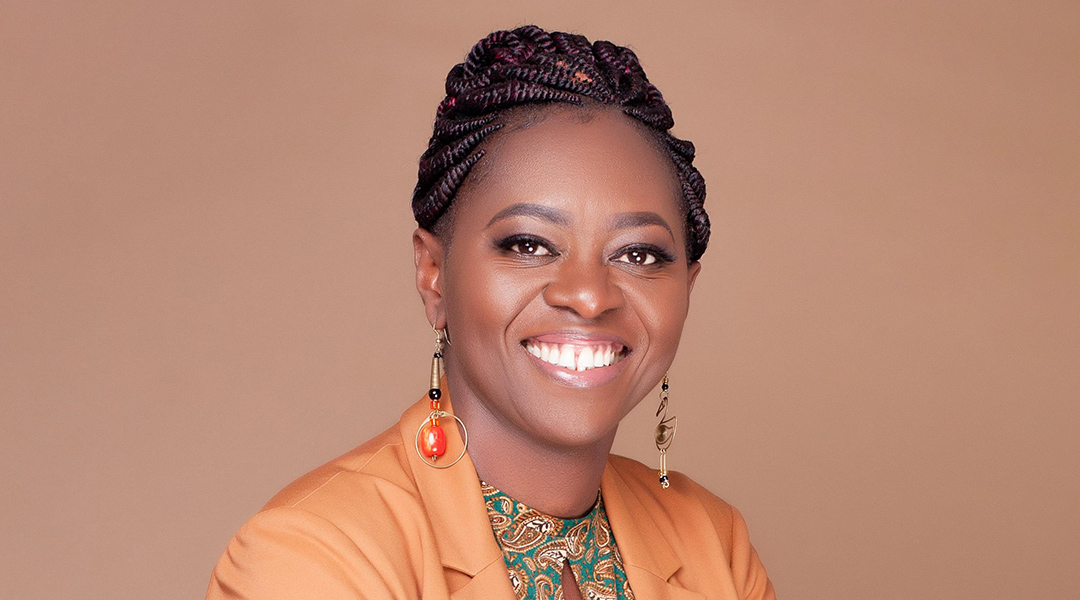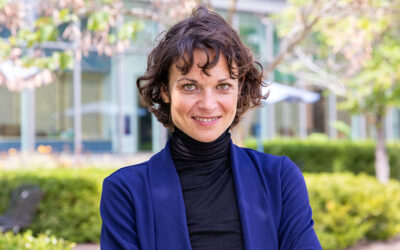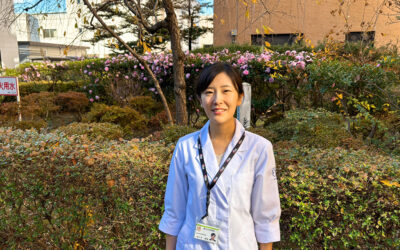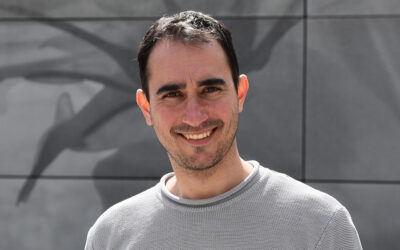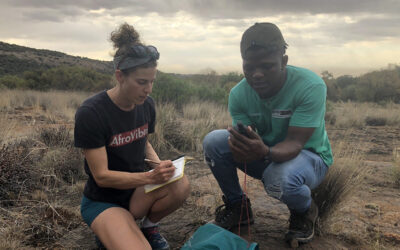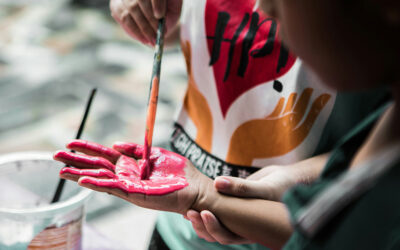As a pediatrician, scientist, strategist, educator, and expert communicator, Faith Osier is pursuing her vision to “Make Malaria History” through vaccination and engaging the next generation of scientists to be part of the solution. As a result, her research explores how antibodies can be used to achieve protection against the parasite, and further aims to understand general mechanisms of immunity to progress our understanding of vaccine development for infectious diseases.
She trains young African scientists to do basic scientific research in vaccine development against malaria. It is this combined effort will help overcome medical challenges and help improve the physical and economic well-being of sub-Saharan Africa, which carries 93% of the malaria burden.
The enthusiasm and love she shows for her work are only matched by the energy she puts into her mentorship and science communication initiatives, as well as her tireless efforts to inspire and elevate science and researchers, especially in Africa where she trains young African scientists in vaccine development.
Tell us about yourself. Where did you grow up? When did you decide you wanted to become a scientist?
I am Kenyan and I grew up in the capital, Nairobi. When I was growing up, my parents introduced me to a young female doctor who had been a student of my mother’s in high school and maintained a friendship with [her]. My parents often told me to become a doctor like this lady and I thought, “Yeah, I’ll become a doctor, and I’ll discover important cures for things like HIV and all these diseases.” So, I had that in my mind from quite early on.
I then started out as a doctor, but eventually turned to doing science in a research laboratory setting. So, I changed from seeing patients, bedside medicine and clinics, to being on the bench in the laboratory. I actually think that if I was not doing science, then I would be [back] doing bedside medicine or some sort of public health job.
Who has shaped your studies and career?
That would be Professor Kevin Marsh [University of Oxford, Ph.D. supervisor]. I think he has been the most important influence of my life in terms of his vision for science, particularly in Africa, also in terms of the way he approached his work with enthusiasm and dedication. He always made the work fun, so you felt like you were really enjoying yourself rather than working. That was inspiring, just how he energized the science.
What advice would you give your 20-year-old self?
I would just say, “Throw yourself wholeheartedly into what you do”. I think that when we are working, we often think we are small and insignificant and it doesn’t matter, but in fact whatever you have in your hand to do, if you give it your whole heart and all your energy, it will give you a lot of dividends.
What is the most formative moment from your early career?
I think one memory that really stands out was working as a junior doctor and feeling irritated that I had to be “on the shop floor” at the hospital on Christmas Day and nights and weekends, and eventually, when I worked as a doctor, I was okay until 5pm, but after 5 o’clock I thought, “Why am I here when everyone else is away and relaxing?”
[Then] one night, in the middle of the night, I was woken up to attend to a patient and there was a mother with a child and I started to [her], “How come you are arriving at this time, in the middle of the night? Where have you been all day?” And she said she had been walking for three days to get to the hospital.
That really shut me up and gave me a lot of perspective on health and on my own behavior in terms of how I perceive life and how I was responding to the challenges in front of me.
What excites you the most about your research?
I think what excited me most is [its] potential to impact lots of lives. I’ve already been doing research for almost twenty years now and I would really like to see that by the time I retired, [I actually changed the lives of people that are affected by the disease with my research]. I am really hopeful that the work that I am doing ultimately contributes to reducing the impact of infectious diseases, especially in Africa.
What would you say has been your most impactful contribution to your field?
I’ve been researching malaria and how humans acquire immunity to the disease and the hope, of course, is that you could emulate or copy what the human [body] is doing and use that to make vaccines that will protect people against the devastating effects of malaria.
I think that to date; my biggest contributions have been to understanding that human immune response to malaria. Through the work that I did in my Ph.D., working alongside others, we showed that the amount of antibody that you make to specific antigens was strongly correlated with protection. I think that was important because a lot of vaccine efforts focus on a single antigen, and we’ve not managed to have a successful and highly effect malaria vaccine to date. Our study showed that we’re probably going to need more than one antigen to make a good malaria vaccine and that it was not enough to have just a little bit of antibody, that people who had high levels of antibodies are those that were protected from the disease.
More recently, in work that we are just writing up now, we’ve shown that our body uses lots of different mechanisms to clear parasites. Once you’re infected by malaria, the community usually looks at the blocking of invasion as the main mode of action of protection, [through] antibodies that block the parasite from getting into red cells and causing disease. What we’ve shown in the last few years is that there are other effective mechanisms at play, and in fact, they are stronger predictors of protection than invasion inhibition. These are mechanisms that involve complement, that involve neutrophils, natural killer cells, phagocytes, and other effector arms of the immune system that hand-in-hand with antibodies, work together for the clearance of parasites.
I think that’s also going to have an impact on how we understand immunity to malaria and those are the sorts of responses we might look for as we test new vaccines for malaria.
What do you consider the exciting developments in your field in the last 5 years?
I think the exciting developments are in the monoclonal antibody field and using those antibodies to further understand immunity, understand what epitopes [antigens, e.g. proteins of a pathogen, that are capable to stimulate a response from the immune system] are important on parasites, and possibly to use those monoclonal antibodies to help us improve vaccines design.
In the last few years, we’ve had lots of monoclonal antibodies against the circumsporozoite protein [protein on the surface of the mosquito-transmitted sporozoite stage of the malaria parasite], which is the lead malaria vaccine candidate. We’ve had others described against RH5 [reticulocyte-binding protein homolog 5, a valid target to avoid the infection of red blood cells by malaria parasites] and other potential malaria candidates, antigens on the surface of the infected red cell, for example.
So, I’m keen that over the next few years that we will use monoclonal antibodies to see whether they could work as therapeutics or things to prevent malaria or whether in fact we could use them to help us design better malaria vaccines.
What future discovery or achievement would you most like to see?
I would really like to see us design a better vaccine that gives us better efficacy and better duration of protection than our current lead vaccine candidate in malaria. What we have at the moment, the efficacy can be improved as well as the duration of action. That would be the dream, that in fact you could improve on that considerably and then have a big impact on the population.
What scientific discovery (any field of research, topic or time in history) do you wish you would have made?
That is an interesting question. I think the thing that still amazes me is antibodies and how tiny they are and how specific they are and how we have the capacity to make billions and billions of them. Therefore, for me it’s still, the ELISA [enzyme linked immunosorbent assay, basis for many different diagnostic tests: pregnancy, allergy, HIV-infection, etc.], a very simple experiment first described by Eva Engvall and Peter Perlmann. That experiment is the foundation of so much of what we do in science today.
I think if there’s one thing that really excites me, it’s a very simple “lock and key” hypothesis that is shown with ELISA. You add the components and you get a response from which you can learn a lot. It’s a very basic principle but it’s taken us a long, long way over the years and a lot of antibody and B-cell [immune cells that produce antibodies and present antigens] work stems from there. I think that is still the one discovery I would have liked to have made and it’s the zone in which I still work.
Antibodies are such powerful things, but we have so many of them and the challenge now is to isolate the ones that are really doing the things that you’re after, and this is where technology comes in.
Which trends in science enthuse or concern you?
I am interested in the fact that there is a lot of focus on strengthening scientific capacity in Africa. That excites me because there is so much need in terms of the burden of infectious disease — in terms of all types of diseases frankly — and very low capacity for scientists in the continent to actually grapple with problems. I think there has been a massive change in awareness or great momentum to support scientists in developing countries so that they can work on the problems that are facing their own countries and I think it’s very important.
Do you think that people living in non-endemic areas are fully aware of how dangerous malaria still is?
I think that probably not, because it just doesn’t affect them. If you see how the world has responded to COVID-19, in less than a year we have a vaccine and we are now working on variants for those vaccines. I think that sheer force of political will just came out because it directly impacted people in Western countries and you just do not see that level of enthusiasm for other diseases that are not prevalent here. So, I don’t think that people appreciate the impact as much as they would if they were directly affected.
Do you see the chance of a potential malaria vaccine being generated with the same speed as the COVID-19 vaccine?
I think it may not be down to a year, but in five years. Part of the reason why we were able to be fast with COVID-19 is because people have had successes with previous viruses, but with a protozoan parasite like malaria, we don’t have a prototype that will say, “Oh, we will quickly use this backbone and hopefully that should work.”
However, I do think that with the amount of resources put into the COVID-19 vaccine development, if that kind of resources were thrown at malaria, I think there would be a lot of innovation to develop vaccines that could work.
You are a TED fellow and have always been very involved in bridging the gap between scientists and the general public. Why is this important to you?
I think that COVID-19 has really given us a chance to communicate science and that has been one of the upsides of the pandemic; that it has allowed everyday people everywhere to think about science and it’s given us a really excellent platform to communicate.
The challenge is communicating how science works, i.e., why does it take long? Getting people to understand that there is trial and error, that we come up with ideas, and only when we are really lucky do those ideas work out — and you get your vaccine. When we’re not, which is unfortunately more often than not, things don’t work out and you might not achieve what you had hoped for.
It’s also difficult to explain funding. Sometimes you’ve got a great idea, but you actually don’t manage to get the funding for it, and so the scientific enterprise is not a one-way up sailing journey but in fact, its lots of ups and downs. While this is fresh in people’s minds, one has the opportunity to convey all these concepts about how science works, maybe even think about better ways of making science better, [for example] think about how we publish etc.
I think it is really important to keep the conversations going because in fact a lot of our research money comes from taxpayer’s money and for people just to understand how that money is spent and why it’s not always successful the minute you go into the field.
You are a mom of 3 children; how interested are they in the research you are doing and has one of them already expressed the wish to become a scientist as well?
I’m afraid not. They are not interested in the fact that I work so hard and don’t understand why I work on the weekends or why I work at night or why I work late or why I travel so much. So, I think that rather puts them off the possibility. However, they are still young, so I won’t completely rule it out that one of them takes a particular interest in science. At the moment they are not showing any. They just love to play but they’re young, they are all under eleven. The oldest is eleven and he is crazy about soccer. The other two are just crazy about all manner of games. No one is trying to think about DNA and vaccines or anything. That will come later, I hope.
Do you talk about research ideas/work at home a lot or not so much?
Not so much. We tend to just relax. I don’t even think about it. Once I go home, I try to just do what the kids were doing, hear how they’re days were at school, see what they are up to, etc. It’s also just gives me a break from my world.
What are …
Your interests outside of the lab?
Watching rugby, Zumba classes, and reading motivational books
What is your favourite destination to travel to?
New Zealand.
What is your favourite dish?
Barbecued meat and potatoes.
A book you can highly recommend?
The Art of War for Women.
A song you can’t get enough of at the moment?
Everything from Luther Vandross. He is my favorite artist.
A show to binge watch?
The Adventures of Sherlock Holmes
Which actress should play you in a biopic?
Lupita Nyong’o
A person you would like to meet?
Barack and Michelle Obama

